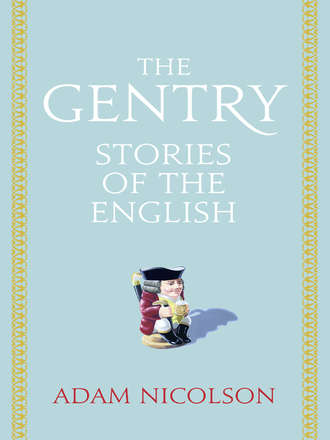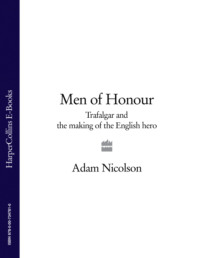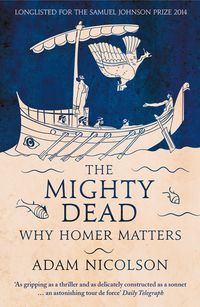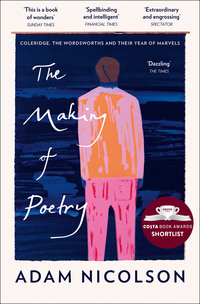
Полная версия
The Gentry: Stories of the English
But their son Thomas wasn’t playing entirely straight. He had lied to his parents, by saying that he thought his father had given permission for the marriage, and even while submitting to his mother’s pleadings and father’s ferocity, he was sending letters to the ever-more desirable Maria, one including a gold ring, another signed ‘your loving husband’.51 Lies were the only way Thomas could find to creep through the labyrinth of fear, love and guilt in which he found himself.
The patriarchs of the two families now took their battle to the courts, first to the Star Chamber, where Mervyn had Thynne demoted from the most prominent magistrate in Wiltshire to the bottom of the list; then to the great church court held in St Mary-le-Bow in Cheapside, where Thynne wanted to prove the illegality of the marriage. There, in the Court of Arches (named after the huge arches of the Norman church), all the principal players were summoned and asked to give witness statements. Those long hearings, which dragged on for four years, are the reason we know so much about this story.
Everybody lied in court. Witnesses were suborned and patience-sapping speeches by lawyers explored the precedents. Aspersions were cast on the character and validity of the man called Welles who had appeared in the pub that evening as an ordained minister. Slurs were laid on the character of the Mervyn witnesses as adulterers and fornicators. Threats of violence were made or alleged. Both sides lobbied the Queen herself. John Thynne attempted to exhaust the Mervyns’ money and courage with expensive and vastly irrelevant legal delaying tactics.52
Not until the early spring of 1601 was there any sign of an end to the fight. Maria Touchet had consistently appeared in the various courts defending the propriety and reality of her marriage. Thomas Thynne had been kept by his parents in hiding somewhere in England, although it seems he may from time to time have managed to see his wife. But then, perhaps at the moment everyone was bored and frustrated by the long legal struggle, the Thynnes seem to have given in. John Thynne’s sister-in-law, Elizabeth Knyvett, wrote to him to say that he and Joan in their anger should not forget to love their son. He had made a mistake, as sixteen-year-olds do, and they should forgive him, and take it as a mistake rather than ‘bitterly in displeasure condemne [it] as an unpardonable offence’. She was a wise woman. Thomas and Maria were now twenty-three. ‘It resteth nowe seeing it is fallen out thus that it be followed advisedly for a fynall end thereof.’53
Only then, extraordinarily, as all appeared to be moving to a kind of resolution and the Knyvetts looked as if they might be organizing some kind of agreement between the parties, did Thomas finally appear in court. It seemed as if he had finally submitted to his father’s will. First, he told the court everything his parents would like to have heard. When Edward Tennant came to his Oxford rooms, Thomas said, he had no idea that the man worked for Sir James Mervyn. He thought this was just an invitation to a party from John Mervyn, his father’s old friend. Nor did he have any idea that John Mervyn had ‘turned Judas’, betraying the Thynnes to the Mervyns. That he should have done so is not in itself surprising: Mervyn family loyalty out-trumped mere friendship. At Beaconsfield, Thomas went on, Lucy Audley and her daughters and all the other Mervyns had plied him with drink and he was ‘so much distempered therewith that he did not, neither doth, knowe or remember in any particular what was further said, done, or practized by him nor them that night’. Crucially, then, he had not been conscious of getting married to Maria and if that was true the marriage was invalid and the Thynnes were free.54
How could the dignity of a man be preserved in this world so dense with manipulation if he did not manipulate things himself? And Thomas, it seems, had learned the arts of survival. Maria, his wife, had with immense self-possession declared the reality of the marriage in hearing after hearing and deposition after deposition. Thomas had been tucked away in the country, effectively imprisoned by his father. Now, it seems, he had got himself to court by agreeing to say what his father wanted him to say. But once that was said, he could then declare his love for Maria. Now at last evidence was produced in the Court of Arches which showed that the marriage was real. When back at Oxford Thomas had written to Maria, signed the letter ‘your loving husband’, sent her a pair of gloves, instructing they should be delivered ‘to his wife’ and another letter with a gold ring in it, on which he had the words ‘a frendes guifte’ engraved.55
This was evidence that Thomas had not been quite so much of a drunken victim on the evening in Beaconsfield. The letters had been asked for earlier in court proceedings but had never appeared. The Oxford historian Dr Alison Wall, who has studied this case in great depth over many years, thinks they may not have existed before 1601 ‘and Thomas may have written them now [in 1601] to prove a marriage his father had forced him to deny’.56 Certainly the judge was impressed by Maria’s lawyers’ claim that ‘the letters this day exhibited in the Court are wholly written with the hand of the said Thomas, and the said letters and ring this day exhibited are the same Thomas sent’.57
Having heard his son’s new evidence, John Thynne’s rage returned at full force. The escape that seemed to be within his grasp had been snatched away. He wrote to Joan, still in Shropshire, from London, where he had been enmeshed in dealings over property disputes. Now he was confronted again with the everlasting crisis over Thomas, his
proud undutiful son … [who] hath to me most undutifully demeaned himself to my no small grief, and for which cause I will also especially stay to see the same either settled or no longer dissembled, and you and myself no more abused, for to my face he used me undutifully, and is such cause of contempt of me as I neither can nor will endure, but will put him to the point either of having of her or utterly leaving of her, to the end I may no more spend in that suit my time and charges in vain.58
This was a gentry cry from the heart: the most important family asset, the son and heir, was not conforming to the managing director’s vision but instead was asserting his own short-term interests over those of the family corporation. These financial-cum-strategic problems were emerging in terms of private family emotions. Thomas was failing to tell the truth, was proud, knew nothing of duty and was abusive and inconsistent in his actions. He could have been sacked (or disinherited) but that in itself would have been shameful. The paterfamilias, so often portrayed by modern historians as a source of grief for his imposed-on children, had in reality few places to turn. No one was more vulnerable than a father to his children.
The great contrast between this overburdening sense of frustration in his relations with Thomas was John’s real love and affection for his wife, Joan, still struggling with their affairs in the wilds of Shropshire. ‘I have sent you a keg of sturgeon and vinegar and Rhenish wine’, he wrote to her on 26 July 1601
And ever live to love thee more and more, I protest I now only desire to live and be with thee. And so good Pug farewell and God bless you and all my children, and send me peace, with all the world
Your ever loving husband during life
John Thynne.59
Soon after this, perhaps in early August, the judge examined Thomas Thynne on oath again and in private, when he ‘confessed the marriage’. The judge then pronounced it valid, the Mervyns the victors and John Thynne defeated. Sir James Mervyn, meeting the judge at a court gathering a little later, ‘told him that in regard of his kind and judicial dealing in that cause, that if he could find any reason to go from the Court, that he should come to me [at Fonthill] and kill a buck, and that from henceforth I would be his guide to Longleat’.60 That was the victorious fixer talking, the courteous and high-status reward – only grandees with parks could offer the killing of a deer as an entertainment – to a public servant who had done the right thing by them.
Usually in this sort of story, that is where it ends: the court case is over and the documentation disappears. Not here, though, because in September 1601 a correspondence opened between Thomas Thynne’s newly acknowledged wife, Maria, and his mother, Joan. These are letters between Romeo’s mother and an unwelcome Juliet. Both sides of the correspondence are preserved in the archives at Longleat and almost nothing in sixteenth-century letters reveals quite so clearly the multiple tensions between generations, between women of subtly different classes, between conformity and individuality, and between the dignity of the self and the requirements of family order.
The first letter that survives from Maria to her mother-in-law is in convoluted and Latinate sentences which read as if they were being spoken from the lowest possible of ground-scraping bows. Maria had written to Joan before (in a letter that has not survived) but had received no answer. Why was that? Was she suspected of duplicity, of not telling her mother-in-law the truth of what she felt? Her manner now was pure obeisance, but the bow was somehow complicated. Her tone implied both family inferiority – a daughter to a mother – and moral equality. She felt no grounds for shame. In fact, she felt so little shame that a sense of irony hangs in curtains around her words. Could the proud, court-holding, seductive and beautiful Maria, maid of honour to the Queen herself, have meant to abase herself quite so much to the daughter of a City merchant, whose title to her lands in Shropshire was suspect, who may have been her mother-in-law but had little else in her favour?
If I dyd knowe that my thoughtes had ever intertayned any unreuerent conseyte of you (my (good mother) I shoulde be much ashamed so Impudintlye to Importune yr good oppinion as I haue done by manye intreatinge lynes, but haveinge binne euer Imboldened wth the knowledg of my unspotted Innocencye, I coulde not be so great an enimye to my owne hapynes, as to wante [i.e. lack] yr fauor for wante of desyeringe ytt.61
Thick with educated paradoxes, this is a form of supplication which is more than halfway to an insult. Its tone might have been calculated to receive no answer. It was Mervyn-speak, driven by rivalry and ambition, and in signing and sealing it, Maria slapped down another pair of challenges. She ended the letter with the phrase ‘Yr very loueng and obedyent daughter Marya Thine’. That encapsulated the whole point: the fact that she had plotted to call herself ‘Maria Thynne’ was the essence of her disobedience. Then, as a final flourish, she enclosed what is either a lock of her red hair, or a now frayed silk ribbon, fixed to the paper with sealing wax, into which she pressed the ancient and noble cross-hatching of the Audley coat of arms. Every one of these signals was made to have its effect: Maria had stolen the son; she had little interest in obeying Joan Thynne; she was glamorous and sexy as Joan could no longer hope to be; and she was the daughter of a peer – one of only sixty titled men in England, a social universe away from the grubby deal-making and warehouses of Joan’s own commercial family.
No answer was forthcoming from the older Mrs Thynne, even though further letters were sent to her at Caus in Shropshire. Maria was living with her own mother Lucy at the Audley manor of Stalbridge in Dorset. The following summer in June 1602, Maria asked her mother to write imploringly to Joan Thynne. All kinds of hazards hung around this letter too: not only had Lucy Audley arranged the kidnapping of Joan’s treasured son; she was the first deep love of Joan’s husband, John, who had given her up only when threatened with disinheritance. Lucy Audley met all of this face on: ‘Notwithstanding the doubt long since conceived how any letters of mine might find a grateful acceptation of yourself (many reasons inducing a distrust) …’62 She spared no eloquence and even through the fog of complexity and Latinity, the idea emerges that Lucy Audley wanted in her heart to see these families united.
Good Mrs Thynne, let me not be wronged in these lines by a hard construction, for I protest that servile fear and base flattery my heart is not acquainted withal. If I desire your love or seek to embrace your friendship (as unfeignedly in all truth I do and wished it long since) believe it to proceed from such a mind as willingly makes offer of the owner for performance of the friendliest effect that her kindness and ability may discharge.63
This was stiff and awkward, a halting statement of love and warmth, which scarcely survives the frost of formality and distance. But the reason is not far to seek: Lucy Audley was trying proclaim her affection and honesty from a history which spoke only of deceit and exploitation.
Lastly since your son is mine, and so beloved as my dearest own, let me obtain this request, my daughter may be yours, but accordingly as to her merits.64
Could you believe her? Perhaps you could, if you read only her imploring words. Maybe not, if you knew both what had come before and where her interests lay. It was entirely within the Thynnes’ power either to acknowledge the validity of the Thomas–Maria marriage or to disinherit him. There were plenty of other sons. Only if Joan and John Thynne accepted Maria as a full member of their family could Lucy Audley and Sir James Mervyn be sure that their plot had worked and that the Mervyns had established their beachhead in Thynne territory. All kinds of access to power would stem from that connection and in pre-modern societies access to power meant access to wealth and wellbeing. No one had any conception of what a gene was in 1602, but here these people were acting to genetic dictates. The individuals writing these letters would scarcely benefit or suffer from these arrangements, however they turned out. Even if the language they used was of honour and honesty, of proclaimed integrity and persistent doubt, it was the genes themselves that were struggling for victory.
Still nothing from Joan. Thomas went to visit her and still she resisted. Maria wrote again into the silence: ‘All that I desire is but to be blessed with your better conceit’65 – a better conception of who she was as a person. But then, at the end of July 1602, Maria tired of her wooing of the mother.
I am determined henceforth to cease troubling you, believing that my letters do but urge the memory of one who is nothing pleasing unto you, but yet not despairing in God’s goodness, I will betake me to my prayers to Him, with this hope, that He who hath wrought some as great miracles as this, will in time incline your heart to pity and pardon your son, and me for his sake.66
Still nothing, but then, months later, out of the blue, Joan wrote to Lucy Audley, Maria’s mother. Her letter is the central document in this story, fusing a powerful consciousness of rank with ‘discomforting grief’67 at her betrayal, all the while taking refuge in her own individual pride. ‘I confess your daughter’s birth far above my son’s deserts or degree,’ she began, ‘but since you were pleased not to scorn my son to be yours, methinks you should not have scorned to have acknowledged me to be his mother.’ There was a dignity that went beyond rank. The rights and privileges of rank did not allow the mistreatment of an individual. This was a question not of the law but of the honourable regard for the humanity of others. Lucy Audley had accused her of feeding her husband’s mind with slanderous tales about the Audleys and Joan replied to that accusation with the same mixture of acute social consciousness and an irreducible sense of her own moral position.
Now for Mr Thynne’s calling of your honour in question, I cannot deny but I have heard it, but that myself was either author or demonstrator of any such reports I utterly deny. I am not so ready to wrong inferior persons, much less an honourable Lady of your place and reputation, and so conceive of me for so you shall ever find me.68
Joan Thynne placed these two codes – social hierarchy and the rules of dealing well with other individuals – face to face. She believed in both but recognized that they did not always acknowledge the value in the other. Thomas had broken one code in favour of the other: ‘He hath hazarded for your love, and yours, the loss of theirs that he was born to honour perpetually.’ It was a gamble he had lost. ‘But this I confess,’ she went on, ‘I have more reason to respect your honour than your friendship towards me.’ Lady Audley was her acknowledged social superior but there was no trusting her goodness.
For two years the situation remained unchanged. Joan repeatedly refused to engage with Maria or Thomas. Maria repeatedly wrote asking her for love. Joan was confined to her remote and difficult, windy and leaky castle at Caus in Shropshire; Maria was pining away either at Fonthill or in the beautiful timber-framed Mervyn manor house at Compton Bassett in the thick-cream-and-butter country of north Wiltshire.
Something of these geographical differences emerged in the letters. Maria, the daughter of a baron, was, despite her proclaimed grief over Joan’s indifference, luxuriating in the lap of her father’s and grandfather’s various manors, distributed across England’s richest and most luxurious county. Joan Thynne meanwhile was a little desperately defending and maintaining her remote property against rival claimants to it.69 Her husband was busy in London; these Shropshire lands were part of the dowry she had brought to the marriage, and so it fell to her to defend and maintain them. Not that he was indifferent to their wellbeing. Joan was struggling to get the farm accounts in good order for her husband’s approval; she found that no one in Shropshire would sell beef or sheep to her at reasonable prices and so asked for some ‘very forward in fat’70 to be sent over from Wiltshire; corn and malt were equally pricy; malt and hops had to come from Wiltshire;71 she asked for salad oil and sturgeon from London;72 lute strings and copper wires for the virginals were posted to her along with ‘cambric thread, silver and spangles’ or sequins.73
She worried from her distance that her husband, whom she scarcely ever saw from one month to the next, was not well. His eyes were troubling him. She sent him ‘physic’ for them along with her letters.
I hope you will have more care of yourself for the good of me and your poor children, humbly desiring you above all things to have respect unto your health, and not to defer the time of taking physic, and let your greatest care be for the preservation of your health, in whose welldoing consist my only joy and comfort. And therefore sweet Mr Thynne, if you love or make account of me have a special regard of it.74
Nearly every other letter in this correspondence, or at least those that have been preserved, was to some extent in public. But Joan’s letters to her husband had the affection and directness of intimate conversation. She hardly ever heard from him, let alone saw him, but struggled to maintain her world alone. The woman Maria imagined her to be was scarcely connected with the woman these loving, careful, generous-hearted letters revealed.
Then came the catastrophe which Maria, Thomas, Lucy Audley and the Mervyns had all been waiting for and which Joan Thynne had been dreading: on 21 November 1604, John Thynne died. Thomas had not been disinherited and so he and Maria took possession of Longleat, the heart of the Thynne estates. Thomas himself seems to have remained in London, leaving Maria in Wiltshire but not apparently trusting her to run his affairs at Longleat. This lack of respect for a woman’s ability to run an estate, as his mother was doing so competently in the wilds of Shropshire, produced an excoriating letter from Maria. She was still at one of her father’s houses, not allowed yet to be mistress of the Thynne properties: ‘Well Mr Thynne, believe I am both sorry and ashamed that any creature should see that you hold such a contempt of my poor wits, that being your wife, you should not think me of discretion to order your affairs in your absence.’75 It was, she said, her right to ‘be mistress there’ – at Longleat – but if he wanted to leave her ‘like an innocent fool here [in her father’s house], I will the more contentedly bear the disgrace.’ It is the angriest letter in the collection, which she signed, furiously, ‘Your loving wife howsoever, Maria Thynne’.76
He soft-soaped her (but his letters don’t survive) and allowed her to take charge at Longleat. Mervyn servants were brought in and old Thynne servants sidelined. She became as she told him ‘a careful officer’ in his absence. His letters from London flirted with her and ‘made her modest blood flush up into [her] bashful cheek’77 so that she wrote back to him as her ‘best and sweetest Thomken, and many thousand times more than these 1000 000 000 000 000 000 000 000 000 for thy kind and wanton letters Thine and only thine Maria’.78 She managed all the men and the complexities of rent and tenancies at Longleat with aplomb. They were happy, in possession of his inheritance, with her now settled in the chatelaine’s saddle.
From that position Maria could abandon the mask of deference. Her mother-in-law, silently or not, had abused her for so long. Now, as the next generation in possession, her loathing and contempt could be allowed to emerge. In a letter that is undated but was probably written not long after Maria’s and Thomas’s arrival at Longleat, the young woman in the comfort of Wiltshire wrote to the old woman in despair and isolation in Shropshire. They were openly at war, engaged on a bitter lawsuit over the Thynne estates and possessions. ‘yf you or yr heyers haue an exspectation in revertion of Longleate howse or garden,’ Maria told Joan, she might as well give up. ‘The case beinge as ytt ys, meethinkes you Should not vnkindlye intermedle, more then mr Thynne doth wth all yr lande of inherytance’ – a phrase meaning those lands Shropshire which Joan had brought to her marriage as a dowry and now formed her own sustenance or jointure.79
As she went on, Maria warmed to her task:
I confes (wthowt Sham) ytt ys true my garden ys to ruinous, & yett to make you more merrye I wyll make you shall be of my Cowncell, that my intente ys before ytt be better, to make ytt worse; for findinge that greate exspence Coulde never alter ytt from being lyke a poridg pote, nor never by reporte was lyke other I intend to plowe ytt up & Sowe all varitye of frute att a fytt Seazon, I beseech you laughe, & So wyll I att yr Captiousnes.80
Joan may have been captious and intent on finding fault but this is as bitter as a perry pear. For a class whose identity was bound so closely to the nature of land and to the shaping and moulding of that land, it would be difficult to find a more explicit form of hate. It is the voice of victory. The previous generation may have done its best to make the land around the house at Longleat into an elegant garden but it had failed and Maria now was planning to erase everything Joan and John had done. Often enough you see in old English houses a new wing added, a garden transformed or an old one demolished; how rarely, though, can you see through a window like this to the vengeance and rage which lay behind the change.
In her anger, and not immediately intelligibly, Maria went on at Joan in language deliberately vile:
now wheras you wryghte yr grownd putt to Bassest vses ys better then manurde then my garden, Surelye yf ytt wer a gandmoother [sic] of my owne Should & equall to my Selfe by bearth, I Should answare that oddious Comparison wth tellinge you I beleeve So Corpulent a La: Cannot butt doo much yr selfe towards the Soyllinge of lande, & I thinke that hath binn, & wyll be all the good you intend to leaue behinde you att Corslye.81
What does this clotted set of insults actually mean? Joan had clearly said in a letter now lost that she was managing her lands in Shropshire better than Maria was capable of doing at Longleat. Even Joan’s roughest ground was more richly fertilized, she had said, than Maria’s best garden. Maria turned dirty in response: first reminding Joan quite how old she was, ‘a grandmother’, when in fact she was in her mid-forties and only twenty years older than Maria; then emphasizing her own noble and Joan’s mercantile origins (‘equal to myself in birth’); then telling her how fat she was (‘so corpulent a Lady’) and then implying, in a brutal and brilliant image of scatological contempt, that, given her size, Joan would clearly be effective at manuring the land herself (‘cannot but do much towards the soiling of land’).82







